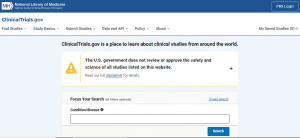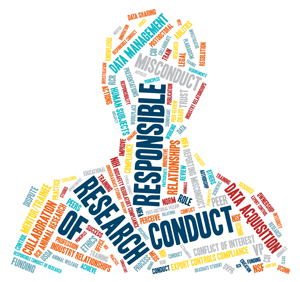 Over the past two decades, government agencies and the International Committee of Medical Journal Editors (ICMJE) have issued laws and directives on the subject of clinical trial registration. All parties have consistently agreed that the purpose of trial registration is to promote the public good by ensuring that the existence and design of clinical trials are publicly available. The registration effort began with the development of a publicly available website, ClinicalTrials.gov, a service of the National Institutes of Health (NIH), developed by the National Library of Medicine.
Over the past two decades, government agencies and the International Committee of Medical Journal Editors (ICMJE) have issued laws and directives on the subject of clinical trial registration. All parties have consistently agreed that the purpose of trial registration is to promote the public good by ensuring that the existence and design of clinical trials are publicly available. The registration effort began with the development of a publicly available website, ClinicalTrials.gov, a service of the National Institutes of Health (NIH), developed by the National Library of Medicine.
In 1997, the Food and Drug Administration (FDA)/NIH began requiring registration for only a limited number of trials. Then in September 2007, the FDA Amendments Act (Title VIII. Sec. 801) significantly expanded the scope of clinical trials that must be registered and set civil monetary penalties for failing to register “applicable trials.” In 2004, the ICMJE defined trials that must be registered in order to be considered for publication in journals that adhere to ICMJE standards. In 2007, the ICMJE expanded the definition of trials that must be registered. Scores of journals (not limited to medical journals) have adopted the registration policy. In 2016, the final rule for Clinical Trials Registration and Results Information Submission (42 CFR Part 11), which clarifies and expands the requirements in FDAAA 801, was released, and the NIH Policy on the Dissemination of NIH-Funded Clinical Trial Information was published.
The bottom line:
The FDA, NIH and the ICMJE each have their own requirements for registration, and while some of the requirements overlap, there are some differences. In order to comply with the law and preserve the ability to publish in many journals, all sets of requirements must be met. UConn Health is committed to supporting Principal Investigators (PIs) with meeting the requirements concerning the public availability of clinical trial data in ClinicalTrials.gov, as outlined in our University ClinicalTrials.gov policy.
How is “clinical trial” defined and what are the registration deadlines?
According to NIH:
A clinical trial is a research study1 in which one or more human subjects2 are prospectively assigned3 to one or more interventions4 (which may include placebo or other control) to evaluate the effects of those interventions on health-related biomedical or behavioral outcomes.5 All clinical trials must be registered within 21 days of enrollment of the first participant.
1See Common Rule definition of research at 45 CFR 46.102(d).
2See Common Rule definition of human subject at 45 CFR 46.102(f).
3The term “prospectively assigned” refers to a pre-defined process (e.g., randomization) specified in an approved protocol that stipulates the assignment of research subjects (individually or in clusters) to one or more arms (e.g., intervention, placebo, or other control) of a clinical trial.
4An intervention is defined as a manipulation of the subject or subject’s environment for the purpose of modifying one or more health-related biomedical or behavioral processes and/or endpoints. Examples include: drugs/small molecules/compounds; biologics; devices; procedures (e.g., surgical techniques); delivery systems (e.g., telemedicine, face-to-face interviews); strategies to change health-related behavior (e.g., diet, cognitive therapy, exercise, development of new habits); treatment strategies; prevention strategies; and, diagnostic strategies.
5Health-related biomedical or behavioral outcome is defined as the pre-specified goal(s) or condition(s) that reflect the effect of one or more interventions on human subjects’ biomedical or behavioral status or quality of life. Examples include: positive or negative changes to physiological or biological parameters (e.g., improvement of lung capacity, gene expression); positive or negative changes to psychological or neurodevelopmental parameters (e.g., mood management intervention for smokers; reading comprehension and /or information retention); positive or negative changes to disease processes; positive or negative changes to health-related behaviors; and, positive or negative changes to quality of life.
Registration Deadline: The NIH Policy on Dissemination of NIH-funded Clinical Trial Information applies to applications for funding submitted to NIH on or after 1/18/17. Registration is required no later than 21 days after the first patient is enrolled. The consent form for the trial is required to include the following language: “A description of this clinical trial will be available on http://www.ClinicalTrials.gov, as required by U.S. Law. This Website will not include information that can identify you. At most, the Website will include a summary of the results. You can search this Website at any time.”
According to the ICMJE:
A clinical trial is any research project that prospectively assigns people or a group of people to an intervention, with or without concurrent comparison or control groups, to study the cause-and-effect relationship between a health-related intervention and a health outcome. Health-related interventions are those used to modify a biomedical or health-related outcome; examples include drugs, surgical procedures, devices, behavioral treatments, educational programs, dietary interventions, quality improvement interventions, and process-of-care changes. Health outcomes are any biomedical or health-related measures obtained in patients or participants, including pharmacokinetic measures and adverse events. Those who are uncertain whether their trial meets the expanded ICMJE definition should err on the side of registration if they wish to seek publication in an ICMJE journal.
Registration Deadline: Registration at or before the time of first patient enrollment is as a condition of consideration for publication in an ICMJE journal.
According to the FDA:
The U.S. Department of Health and Human Services in September 2016 issued a final rule that specifies requirements for registering certain clinical trials and submitting summary results information to ClinicalTrials.gov. The new rule expands the legal requirements for submitting registration and results information for clinical trials involving U.S. Food and Drug Administration-regulated drug, biological, and device products. The FDA Amendments Act (Title VIII. Sec. 801) requires registration for all “applicable clinical trials,” regardless of funder, that are:
- Trials of drugs and biologics: Controlled, clinical investigations, other than Phase I investigations, of a product subject to FDA regulation, and
- Trials of devices: Prospective clinical studies of health outcomes comparing an intervention with a device against a control in human subjects (other than small clinical trials to determine the feasibility of a device, or clinical trials to test prototype devices where the primary outcome measure relates to feasibility and not to health outcomes); and pediatric postmarket surveillance studies, as required under the Federal Food, Drug and Cosmetic Act.
Registration Deadline: The FDA Amendments Act of 2007 requires that all trials, regardless of sponsor, must be registered in full no later than 21 days after the first patient was enrolled.
Who is responsible for registering a trial?
The PI is ultimately responsible for determining that registration requirements are met. Although some industry sponsors will do the actual registration work, it is still the PI’s responsibility to ensure that the registration has been accomplished and is accurate.
What are the penalties for failing to register?
According to the ICMJE:
Unregistered trials will not be considered for publication in journals that adhere to ICMJE standards. Questions about policies of a specific journal should be addressed to that journal directly.
According to the FDA/NIH:
Penalties may include civil monetary penalties up to $14,724 fine for failing to submit or for submitting fraudulent information to ClinicalTrials.gov. After notification of noncompliance, the fine may go up to $14,724 per day until resolved. For federally-funded grants, penalties may include the withholding or recovery of grant funds.
Who can help with questions about meeting the requirements?
To comply with University policy regarding ClinicalTrials.gov, please direct any questions to the local Protocol Registration and Results System (PRS) Administrator for UConn/UConn Health, Ellen Ciesielski, Research Integrity & Compliance. The local PRS Administrator serves as a point of contact for resolving requests by ClinicalTrials.gov and regularly monitors to promote compliance with the requirements.

